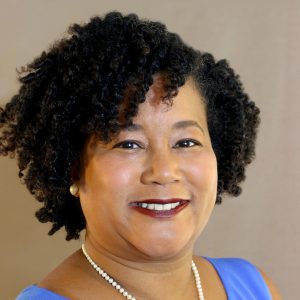Impact Stories: Taundra
Zionsville teacher on a mission to recruit women and minorities into CS classes

In the relatively small suburban town of Zionsville, IN, nestled in the southeast corner of Boone County less than 14 miles from Indiana’s capital, Taundra Miles-Cranor is the sole computer science teacher at Zionsville Community High School. A black female exposing students to a predominately white and male industry, she’s on a mission: to show every student that someone who looks like them can succeed in computer science.
Since females outnumber males in the US population and Indiana, one might expect to find a fairly even split in her classes between males and females, especially with the emphasis on STEM in the last few years. But, as in most computer science classes, that’s not the case.
For this school year, just 6 out of 51 students taking AP Computer Science A (Java) are female; out of 31 in AP Computer Science Principles, it’s 5. Last year, 4 out of 50 total students were girls.
Those numbers – and what she learned through Nextech’s professional development training – prompted Miles-Cranor to start the school’s first Women in Business and Technology Club and take other measures to increase minority participation, even during a pandemic.
“The girls I have in my classes are quite talented and interested in computer science, but I’m not sure our counseling staff knows enough about us to market our class,” she said. “And counselors are often overloaded. They’re helping us solve problems already. The way schools have defined their role leaves no time for them to steer students who might be a good fit our way. So I’ve taken it on myself to market and diversify my classes.”
The high school holds a Club Fair each year, including a virtual one last fall for which she created a sales video to recruit members. The Club has sponsored a panel of women from several careers, held an Hour of Code, will take part in Ivy Tech’s Tech Week and plans to present a women’s history panel. She also teaches business classes and those students help with word-of-mouth marketing.
Not bad for a teacher who had no training in computer science when she agreed to teach it.
Nextech as a safety net
Like many, Miles-Cranor fell into computer science instruction because she taught business.
“I started 2 weeks into the school year, and classes were already using curriculum from Code.org [a Nextech partner]. I just had to survive that first year. I played a supporting role, guiding students through the lessons,” she said. “Then I learned Nextech offered a tremendous amount of professional development. I feel very fortunate that I found all they offer. They are an organization that is trying to do really good equity work and really good work to prepare computer science teachers for teaching.”
Miles-Cranor is finishing up a year-long training Nextech program and has applied to the computer science licensing session. Once she takes the exam prep course and passes the test, computer science will become an official part of her teaching license.
“Right now, I can teach computer science because I have Business on my license, but it may not always be that way,” she said. “I want to make sure I can keep teaching this subject if the rules change.”
She also recently learned she’d been chosen to join Nextech’s Techquity Council, teachers and students from various backgrounds across Indiana that will help keep equity at the forefront of all Nextech’s work.
An interested teacher
Equity and diversity are top of mind for Miles-Cranor. Out of over 100 staff members, she is one of just three African Americans. As for students, “African Americans make up about 2%, though we do have more students of color. I didn’t have one African American student last year, which, being an African American female, was disappointing,” she said.
She’s addressing this imbalance in her classes by making a point of being approachable, interested in her students’ lives and visible in the school. It’s paying off.
“One of my best students this semester in Computer Science Principles is African American – he had me for Intro to Business, so he knew me and asked specifically about the class. Others just found out about me and asked me about it. A lot of the interest is based on my reputation,” she said. “I’m a laid-back teacher who celebrates student successes. We’ve had a trying year, so I tend to be very gracious toward my students. I make sure to ask how they’re doing, what support they need. I’ve become known as an understanding teacher. So students are more willing to give a class I teach a try – even if it’s computer science.”
When asked what high schools need to do to get more young women and minorities into computer science, Miles-Cranor said they need to look at how they recruit teachers and students for science classes in general.
“Females and people of color aren’t traditionally seen in computer science, and women tend to be underrepresented in all STEM fields. Schools must recruit purposefully to get people in place who look like all their students.”
Many parents didn’t have computer science classes when they attended school, so they, too, are unfamiliar with the concept.
“My department has always struggled to get people to understand what we have to offer. For next year, we’re creating a department website to show all our course offerings, provide explanations, we’re even filming commercials, which is an idea I got at a Nextech training. We really want to advertise all the things we have that students and parents and counselors don’t know about.”
‘It’s a win all around for teachers’
“I feel like so many other CS teachers found Nextech the same way I did: by falling into a teaching position and then falling into Nextech. I wish every teacher and school knew about all the professional development opportunities. Not only is it free, but Nextech pays us for our time and gives us a professional development certificate. It’s a win all around for teachers,” Miles-Cranor said.
She knew Nextech was the right place for her when she received a package before the first session.
“We couldn’t meet in person because of COVID, so they sent us everything we would’ve gotten if we’d been there: a T-shirt, a cozy blanket, a water bottle and snacks labeled for every day of the training! It was so incredibly thoughtful.”
Read about the Women in Business and Technology Club here.

In the relatively small suburban town of Zionsville, IN, nestled in the southeast corner of Boone County less than 14 miles from Indiana’s capital, Taundra Miles-Cranor is the sole computer science teacher at Zionsville Community High School. A Black female exposing students to a predominately white and male industry, she’s on a mission: to show every student that someone who looks like them can succeed in computer science.
Since females outnumber males in the US population and Indiana, one might expect to find a fairly even split in her classes between males and females, especially with the emphasis on STEM in the last few years. But, as in most computer science classes, that’s not the case.
For this school year, just 6 out of 51 students taking AP Computer Science A (Java) are female; out of 31 in AP Computer Science Principles, it’s 5. Last year, 4 out of 50 total students were girls.
Those numbers – and what she learned through Nextech’s professional development training – prompted Miles-Cranor to start the school’s first Women in Business and Technology Club and take other measures to increase minority participation, even during a pandemic.
“The girls I have in my classes are quite talented and interested in computer science, but I’m not sure our counseling staff knows enough about us to market our class,” she said. “And counselors are often overloaded. They’re helping us solve problems already. The way schools have defined their role leaves no time for them to steer students who might be a good fit our way. So I’ve taken it on myself to market and diversify my classes.”
The high school holds a Club Fair each year, including a virtual one last fall for which she created a sales video to recruit members. The Club has sponsored a panel of women from several careers, held an Hour of Code, will take part in Ivy Tech’s Tech Week and plans to present a women’s history panel. She also teaches business classes and those students help with word-of-mouth marketing.
Not bad for a teacher who had no training in computer science when she agreed to teach it.
Nextech as a safety net
Like many, Miles-Cranor fell into computer science instruction because she taught business.
“I started 2 weeks into the school year, and classes were already using curriculum from Code.org [a Nextech partner]. I just had to survive that first year. I played a supporting role, guiding students through the lessons,” she said. “Then I learned Nextech offered a tremendous amount of professional development. I feel very fortunate that I found all they offer. They are an organization that is trying to do really good equity work and really good work to prepare computer science teachers for teaching.”
Miles-Cranor is finishing up a year-long training Nextech program and has applied to the computer science licensing session. Once she takes the exam prep course and passes the test, computer science will become an official part of her teaching license.
“Right now, I can teach computer science because I have Business on my license, but it may not always be that way,” she said. “I want to make sure I can keep teaching this subject if the rules change.”
She also recently learned she’d been chosen to join Nextech’s Techquity Council, teachers and students from various backgrounds across Indiana that will help keep equity at the forefront of all Nextech’s work.
An interested teacher
Equity and diversity are top of mind for Miles-Cranor. Out of over 100 staff members, she is one of just three African Americans. As for students, “African Americans make up about 2%, though we do have more students of color. I didn’t have one African American student last year, which, being an African American female, was disappointing,” she said.
She’s addressing this imbalance in her classes by making a point of being approachable, interested in her students’ lives and visible in the school. It’s paying off.
“One of my best students this semester in Computer Science Principles is African American – he had me for Intro to Business, so he knew me and asked specifically about the class. Others just found out about me and asked me about it. A lot of the interest is based on my reputation,” she said. “I’m a laid-back teacher who celebrates student successes. We’ve had a trying year, so I tend to be very gracious toward my students. I make sure to ask how they’re doing, what support they need. I’ve become known as an understanding teacher. So students are more willing to give a class I teach a try – even if it’s computer science.”
When asked what high schools need to do to get more young women and minorities into computer science, Miles-Cranor said they need to look at how they recruit teachers and students for science classes in general.
“Females and people of color aren’t traditionally seen in computer science, and women tend to be underrepresented in all STEM fields. Schools must recruit purposefully to get people in place who look like all their students.”
Many parents didn’t have computer science classes when they attended school, so they, too, are unfamiliar with the concept.
“My department has always struggled to get people to understand what we have to offer. For next year, we’re creating a department website to show all our course offerings, provide explanations, we’re even filming commercials, which is an idea I got at a Nextech training. We really want to advertise all the things we have that students and parents and counselors don’t know about.”
‘It’s a win all around for teachers’
“I feel like so many other CS teachers found Nextech the same way I did: by falling into a teaching position and then falling into Nextech. I wish every teacher and school knew about all the professional development opportunities. Not only is it free, but Nextech pays us for our time and gives us a professional development certificate. It’s a win all around for teachers,” Miles-Cranor said.
She knew Nextech was the right place for her when she received a package before the first session.
“We couldn’t meet in person because of COVID, so they sent us everything we would’ve gotten if we’d been there: a T-shirt, a cozy blanket, a water bottle and snacks labeled for every day of the training! It was so incredibly thoughtful.”
Read about the Women in Business and Technology Club here.


